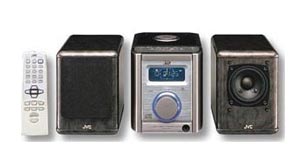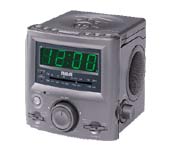![[SoundStage!]](../sslogo3.gif) Fringe with Greg Smith Fringe with Greg SmithBack Issue Article |
| October 2000 Mini-Systems While it's always nice to have more money to spend on audio, sometimes a small budget is all you have to work with. Recently I've had a lot of requests for help from people who really don't have a lot of cash to spend, so I've become familiar again with that very neglected form of playback, the mini-system. While there's no hard terminology or rules, I generally define a mini-system as one that costs under $400 total and has a limited set of capabilities. These are distinguished from rack systems, which include a full complement of features and can run well over $500. In my mind, if you're spending more than $500, you should get separate components instead of any all-in-one box. You can buy reasonable-quality pieces by spending $150-$200 on each of a CD (or DVD) player, receiver, and speakers. The resulting system will have a clear upgrade path, a fairly long life, and should sound noticeably better than a similarly priced all-in-one system. I'll look at some sources to pull that off in my next column. But the fact is that $500 is too much to spend for some people or in some applications, and it's hard to buy separates and spend much less than that. In that case, I'd recommend cutting down on the set of gadgets you're looking for and focus instead on a stripped-down yet high-quality unit instead. Any mini-system I've ever seen has a one-year warranty on it, and this should be a warning flag if you can't afford to replace the system every year. Since the components that go into a less expensive piece of gear are invariably less reliable, I consider this the most important thing to consider when selecting one of these boxes. The main key to long-term reliability with any audio system is to minimize the moving parts. If you look at what classically goes wrong with audio equipment you've been using for a while, the first thing that's likely to stop working or get badly out of alignment is the CD transport mechanism or the tape deck motors. Next on the trouble-likelihood scale are any knobs or buttons that are handled a lot, particularly motorized ones operated from the remote. The potentiometers and switches that make up these sections of the product definitely have a life span measured in years rather than decades before they get noisy during operation or fail altogether. Compare that with a set of speakers, which can easily last ten to twenty years before showing any signs of wear. Accordingly, my first very strong recommendation is that you avoid buying any mini-system with a CD changer. While I love being able to play a number of discs without swapping, it's impossible to build a really reliable changer into an inexpensive product. The worst part is that, in the context of a mini-system, once the CD mechanism goes, you're stuck with replacing the entire unit. The parts involved are so tiny and buried in the box that any repair will cost a substantial portion of the replacement cost. While I haven't bought a tape deck in years, those are equally likely to cause trouble in the long term. Similarly, if at all possible, avoid buying
something with a moving drawer. The units I like the best are all top-loaded, so the only
thing that's in motion when you're inserting or removing a CD is a hinged, external item
that could be replaced economically. Because I try not to get stuck in audio-snob mode and automatically dismiss the really low-budget stuff, I do listen to little systems like this regularly. The main thing that bothers me about really inexpensive products is not so much what they're missing but how the manufacturers try to make up for it. For example, most small boxes include a single-driver speaker, typically a 3" cone. With a speaker that size, you're going to have limited response at the high and low ends of the frequency spectrum. This is acceptable by itself, but some designs try to make up for this by adding equalization to try and extend the driver beyond what it's capable of doing cleanly. If, for example, your speaker only plays up to 12kHz, it's tempting to put a big boost around this frequency to try and get some more response above that point out of the system. Similarly, a big hump in the bass at 100Hz will give a bit more deeper bass out of a box that can't support lower frequencies. As far as I'm concerned, I'll take a limited frequency range over a broader and more colored response any day. Any EQ done to add more treble or bass is going to exaggerate parts of the speaker's output that were previously flat, and this drives me way more crazy than missing some sparkle or boom does.
"Mini" may mean small, but it doesn't have to mean awful. Happy hunting, and let me know if you find something small and really good along the way. ...Greg Smith
|
|
![[SoundStage!]](../sslogo3.gif) All Contents All ContentsCopyright © 2000 SoundStage! All Rights Reserved |
 As
an example of a unit that is relatively free of parts that can break easily, see the
As
an example of a unit that is relatively free of parts that can break easily, see the  This was really called to mind recently when I went
shopping for a better clock radio. I'm regularly away from home, stuck in a hotel room,
and not having any music to listen to has been driving me crazy. Headphones aren't really
an option, as I often want to listen as I'm eating, packing, or doing similar activities.
Since I needed a new alarm clock anyway after my luggage was stolen out of my trunk one
night, I decided that one that could also play CDs would be a big bonus. Many of the units
I was looking at were billed as having SuperDuperBass enhancement circuitry or a
three-band EQ that would improve the sound. All of these features suck; if the money spent
on that circuit was instead applied to making the speaker sound a little better over its
useful operating range, the result would have to be better. After a bit of listening, I
ended up spending $60 on a CD clock radio at the local Target, the
This was really called to mind recently when I went
shopping for a better clock radio. I'm regularly away from home, stuck in a hotel room,
and not having any music to listen to has been driving me crazy. Headphones aren't really
an option, as I often want to listen as I'm eating, packing, or doing similar activities.
Since I needed a new alarm clock anyway after my luggage was stolen out of my trunk one
night, I decided that one that could also play CDs would be a big bonus. Many of the units
I was looking at were billed as having SuperDuperBass enhancement circuitry or a
three-band EQ that would improve the sound. All of these features suck; if the money spent
on that circuit was instead applied to making the speaker sound a little better over its
useful operating range, the result would have to be better. After a bit of listening, I
ended up spending $60 on a CD clock radio at the local Target, the